Caring for a Blind Dog or Cat

Are you caring for a blind dog or cat? If a pet develops blindness in their older years or becomes visually impaired, it can be challenging for you and your furry one. Losing sight can be scary for a pet that relies heavily on that sense for their safety and sense of familiarity.
Normal routines may be difficult and there is increased risk of injury and accident if your pet is blind or visually impaired. The good news is that your pet can continue to live a happy life with a little help.
Oakland Veterinary Referral Services is here to provide simple steps you can take to make your visually-impaired pet less vulnerable to injury, as well as increase their quality of life.
13 Helpful Tips for Caring for a Blind Dog or Cat
Any pet is susceptible to visual impairment, but the older the pet, the more common it becomes. Blindness can be due to cataracts, glaucoma, progressive retinal atrophy, an eye injury, and retinal degeneration. In some cases, it can be congenital, occurring at birth. There is no reason, though, why a pet cannot live a good life, but they do require some extra care.
- Don’t change the furniture placement. Moving furniture around can disrupt your blind pet’s ability to safely navigate throughout the home. For them to feel safe, they need to know how to easily get between points.
- Pick up clutter. Make sure all pathways are clear for your pet. Remove items that can create a barrier for them, as well as anything they can stumble over.
- Cover sharp objects. Put away or cover pointed edges, glass that could break, and other jagged objects around the home. Close cabinets and doors, so that your pet doesn’t run into the corners.
- Use baby gates. In areas that are unsafe for your pet, make ample use of baby gates to close off these places to prevent your pet from wandering in.
- Close doors that lead to steps. Keep your pet from falling down steps by closing doors that lead to them, such as a basement door. If there isn’t a door, use a baby gate.
- Use carpet runners for direction. Many pets use the tactile difference of a textured carpet or floor runner. Line them down halls and to common areas where your pet wants to be. They will use the floor mat for direction.
- Alert your pet to your presence. Since your pet can’t rely on their eyes to know you are there, speak to them in a soft, even tone often. This will alert them to your presence and give them reassurance that their person is nearby.
- Make use of bells. Other pets can startle your furry friend, which creates undue stress on them. Put bells on the collars of other pets, so your blind pet knows that they are approaching.
- Keep your pet leashed. For visually impaired pets, more control over their whereabouts is key to avoiding accidents. Use a harness with a short leash (never a retractable one) so that you have a greater ability to keep them near you.
- Inform other people about your pet. If someone wants to interact with your pet, let them know of their disability. That way, they can make noise as they approach. They should permit your pet to sniff them and listen to their voice before they are petted.
- Never leave your pet alone outside. Pets with hearing or vision impairments are at risk of wandering off or being hit by a car, attacked by another animal, or other forms of injury. Keep close watch when you’re relaxing outdoors with them, so that they don’t become disoriented or uncomfortable.
- Snuggle with them. It can be hard for a blind pet to feel safe in the world. When you speak to and snuggle them, they can share the same closeness you have always shared with them. Touch can be incredibly soothing for a pet who is blind or has visual impairment.
- Don’t forget exercise and enrichment. Your dog may be blind, but they still need daily exercise. Choose short walks on an easy to navigate surface, or get a large ball or something they can recognize, and roll it around them. They may even enjoy tug of war, since it doesn’t require visual acumen for them to have fun and burn off some energy.
Additional Information: Caring for a Blind Pet
If you would like additional information about caring for a blind dog or cat, please call us. You may also wonder if your pet is having vision issues. We can examine and get the correct diagnosis for them, so feel free to schedule an appointment for your sweet pet.


